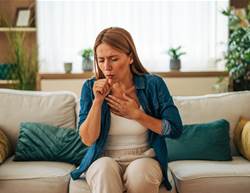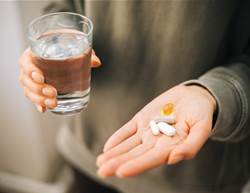If you’ve been experiencing a burning feeling in your chest or throat at night, you’re not alone. According to NPS Medicinewise 'it is one of the most common gastrointestinal conditions in Australia. It is estimated to occur in 10–15% of the population, with a rising prevalence, most likely due to obesity.' Which is why knowing how to get rid of heartburn (and reduce symptoms) is so important!
“Heartburn is the sensation of burning in the middle of the chest when acid from the stomach gets into the food pipe,” says Dr Mark Pimentel gastroenterologist and and author of The Microbiome Connection.
Also referred to as acid indigestion, this uncomfortable reaction may present itself as a bitter taste in the mouth, while symptoms typically occur after eating and/or usually at nighttime, states Dr Vivek Cherian. “While not always the case, pain oftentimes can worsen when you bend over or lie down,” he adds.
In fact, heartburn has nothing to do with the heart and is actually a symptom of gastroesophageal reflux or GERD, a more severe and long-lasting condition that could lead to complications over time. “While the classic symptom of GERD is heartburn, this symptom is only seen in about 50% of people with GERD,” states Dr Pimentel.
Let’s dive into tips for how to get rid of heartburn fast—and reasons you might get heartburn in the first place.
How to prevent heartburn
If heartburn has set your chest or throat aflame, here are a few remedies that may help extinguish the fire:
Loosen up
Cinching your waist with a belt or squeezing into tummy-control shapewear may be further aggravating your digestive system. Do yourself a favour—take off anything that’s form-fitting and change into a comfy (a.k.a. baggy) top and bottom. “Tight clothes can put pressure on your stomach triggering heartburn,” says Dr Cherian.
Sit up straight
While you may feel like curling up in bed or sprawling out on the couch, being flat on your back could exacerbate symptoms. Dr Pimentel warns not to lie down right after eating and Dr. Cherian adds to avoid lying down for at least two to three hours after consuming a meal. Instead, sit (or stand) in an upright position and allow gravity to keep bile and acids from traveling back up into the oesophagus.
Put down the pinot
According to a meta-analysis of 29 studies published in the journal Alcohol and Alcoholism, researchers found an association between drinking alcohol and the risk of GERD, where those who drank wine, beer, or spirits more frequently were shown to be at a higher risk. Furthermore, a review published in the journal Best Practice & Research: Clinical Gastroenterology states that both alcohol and tobacco can weaken the lower oesophageal sphincter or LES, a ring of muscles located at the bottom of the oesophagus where it meets the stomach, causing stomach acids to flow backwards.
Chew gum
Grab yourself a stick of gum. Years ago, researchers from London discovered that volunteers who were instructed to consume a meal that would normally induce gastric reflux were less likely to deal with heartburn symptoms after chewing sugar-free gum for 30 minutes after eating. Then a study published in the Journal of Neurogastroenterology and Motility suggested that gum chewing increases salivary flow rate, which may neutralise stomach acid. However, skip the peppermint flavoured gum since peppermint is a potential trigger food.
Sip this tea
An ancient herb that has been relied on to aid in relaxation and promote better sleep, chamomile may serve as a comforting beverage during heartburn. A review published in the international journal Molecular Medicine Reports highlighted that chamomile is used traditionally for multiple gastro conditions, such as digestive disorders and gastrointestinal irritation, and can be “especially helpful” in soothing the stomach and relaxing the muscles that move food through the intestines.
Use a wedge pillow
Gravity is one of our biggest protections against acid reflux. So once it’s time to go to bed, lie down on an incline. “Sleeping at an angle—one that keeps your head elevated—can help stomach acid from backing up,” explains Dr Cherian. An article published in the journal Missouri Medicine states that the “only proven lifestyle modification” to manage GERD is “head of bed elevation” since it’s been shown to decrease the frequency of stomach acid moving back up into the oesophagus.
Talk to your pharmacist
When lifestyle modifications aren’t enough, over-the-counter meds will likely alleviate the discomfort. “There are several classes of medications that can help relieve heartburn, including proton-pump inhibitors (PPI) and H2 receptor antagonists [also referred to as H2 blockers], both of which can reduce the amount of stomach acid, followed by antacids, [which can neutralise stomach acidity],” says Dr Cherian. “While antacids may provide the quickest relief, they will not help heal a damaged oesophagus caused by stomach acid.”
If you’re depending on OTC meds for heartburn more than twice a week, consider discussing these symptoms with your doctor.
Common causes of heartburn
The occasional bout of heartburn could be brought on by a number of factors, starting with the number on the scale. Being overweight is a leading cause of reflux, says Dr Pimentel, while Dr Cherian explains that additional pressure on the abdomen (including pregnancy) can “essentially force acid up into your oesophagus.”
Certain foods have also been shown to trigger heartburn, such as chocolate, coffee, peppermint, greasy foods, spicy foods, and tomato products. There’s also a chance that a prescription medicine could be the culprit.
“One of the first things we look at are possible medication side effects since certain meds, like pain and anti-inflammatory medications, can contribute to heartburn,” says Dr Cherian.










